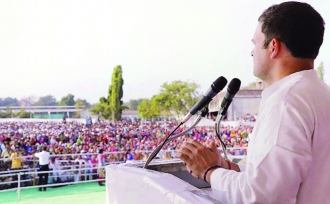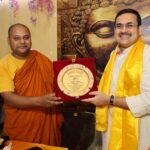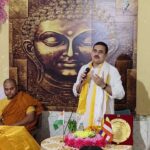Peddling falsehoods Gujarat campaign
- By : Anirban Ganguly
- Category : Articles

In a couple of days, the Gujarat election result will bring to fore the benefits of trench warfare and expose a bunch of unnch people and their haute couture logic
Around the time when the habitually foul-mouthed Mani Shankar Aiyar was having dinner with some of his unnch friends at his residence in Delhi and entertaining his Pakistani acquaintances — who far outnumber his Indian acquaintances — and around the time when he aimed the neech expletive at Prime Minister Modi, a group had gathered in faraway Brussels at the European Union Parliament to discuss, India @ 70, Modi @ 3. 5: Capturing India’s Transformation Under Narendra Modi, a book that had just appeared putting together chapters written by experts.
A group of leading Members of the European Parliament (MEP) had come together to engage with a group from India led by Member of Parliament Swapan Dasgupta (I happen to be part of the group), and had the opportunity of speaking on Prime Minister Modi’s approach to and philosophy of governance. Leading German MEP, Jacob Von Weizsacker, was the host of the event and took it upon himself to admirably conduct the entire discussion.
One of the term that some of the MEPs and intellectuals, who had gathered for the event, used while describing Prime Minister Modi was “revolutionary transformer”, so while a former Union Minister, a former diplomat with unnch friends across the world preferred to refer to Modi as neech, a group of very influential policy makers, policy shapers and influencers, preferred to see Modi as one who was shaping a new era in India, who was astutely positioning Indian in the world and who was gradually but surely shaping the contours of a new Indian narrative, which for the world as much as for the people of India, offered exciting possibilities. These policy-makers are independent minded, leaders in their own right and had no reasons to try to impress their Indian interlocutors.
That the Congress has reached its lowest intellectual quotient in the last few years, especially since Rahul Gandhi took over the decision-making process, was further corroborated with Mani Shankar Aiyar’s outburst against Modi. However, since expletives were hurled at Narendra Modi, they did not generate half the opprobrium that they should have. It has been de rigueur when it comes to Modi, at least that is what the pattern of the last decade indicates, that one can get away with abusing him and with hurling invectives, especially if the invective hurler happens to have a gilded pass to and is a life member of some of the elite clubs of the national capital or of the ‘elite collective’, or the ‘organised elite’ across the country and has unnch friends across the world, especially in Pakistan.
Aiyar’s friends naturally did not condemn his expressions, the only question that they kept asking anxiously is the impact his comment will have on the results of the Gujarat election. In a similar manner, since it was Aiyar now who was dinning with Pakistanis, or it was Rahul Gandhi earlier — at the height of the Doklam episode — who was dinning with the Chinese, it did not matter, they had after all unnch friends and knew exactly how to spell and pronounce crème brulée! For the same reason, it also did not matter in 2007, when Rahul Gandhi’s mother abused Modi as a maut ka saudagar, similarly it did not matter to these elite salon-goers now that Aiyar called Modi neech — these, they aver, only made Modi “communalise” Gujarat politics to his advantage. Elite salons are naturally sustained and run through “haute-couture” logic, a logic that is usually crumpled, full of gaping holes, dangling and unstitched at some places and simply torn in others.
The Gujarat election campaign phase has given rise to interesting times. It has made a habitually silent and semi-somnolent former Prime Minister, who presided over one of the most corrupt regimes in the history of independent India — all the while whining that corruption was perpetrated without his knowledge and information — speak up in trying to justify his breaking bread with Pakistanis and keeping the Indian foreign policy establishment in the dark. The Gujarat election has seen him desperately trying to paint his incompetent and blundering tenure as one of the most forward looking and dynamic phase of India’s growth.
When a Congress leader, a former Prime Minister, who has been beholden to a family, which has had a history of playing havoc with our Constitutional institutions, accuses Narendra Modi of tarnishing every constitutional office, one is certain that interesting times have come over us. A party which bungled in handling terror attacks, whose Union Home Minister was more interested in changing suits and hairdos rather than ensure that terrorists were pursued, who allowed the perpetrators of the Bhopal Gas leak to get away, now wears the badge of nationalism.
In fact, by being subservient for a decade to the whims and vagaries of Rahul Gandhi and his mother, Manmohan Singh had severely dented and tarnished India’s constitutional and democratic offices and framework. It was when he allowed Rahul Gandhi to tear apart the Ordinance, in a sense, literally on his face, that Manmohan Singh made a ‘complete nonsense’ of our Constitutional sacredness and propriety. Thus, instead of making rhetorical statements, Singh ought to desist from making public pronouncements and instead spend his time in serious introspection and atonement.
In every elections, Aiyar’s club hopping friends, who have been mostly the recipient of his party’s largesse across the decades, have read nervousness in Modi and his principal lieutenant Amit Shah. During the Uttar Pradesh election, when Modi undertook a road show in Varanasi — his parliamentary constituency — they read nervousness in his approach, when Modi addressed multiple scores of public meetings across the State, a practice that has been fundamental to his approach to elections, they read nervousness in his demeanour and now in Gujarat too, they perceive nervousness in his approach since he has been ‘camping’ in Gujarat, generals, they argue, never fight in trenches.
This is another sample of the skewed ‘haute-couture’ logic. These salon-goers overlook the fact that generals, when it comes to the BJP, have always fought in trenches. Moreover, when it comes to Modi and Amit Shah, they have always fought in trenches, it is their style, and it is their approach to electoral battles that has fundamentally altered the manner in which elections are being fought. In the Congress’s case, the family hardly ever fights in trenches and when it does, the results are disastrous, to read nervousness in Modi’s and Shah’s electioneering style displays nervousness and cluelessness in those analysts themselves.
A few more days and the results of Gujarat will be out for everyone to see; it will reveal the benefits of trench warfare, the disasters of a neech mindset and will have exposed a whole lot of unnch people who see no wrong in tangoing with India’s enemies…

















